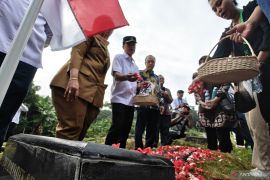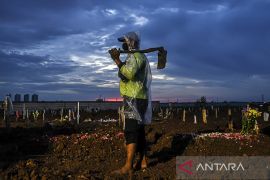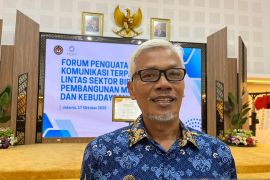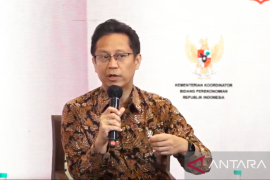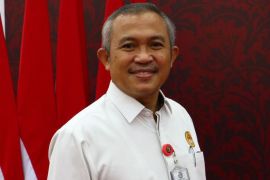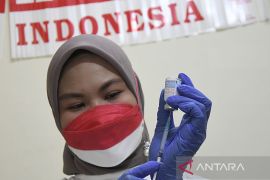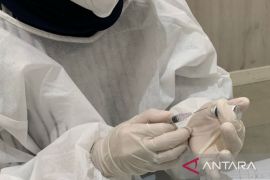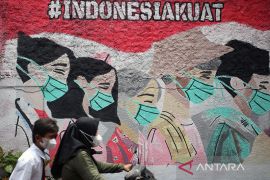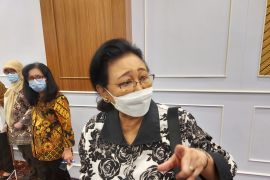No country, hospital, or clinic can keep its patients safe unless it keeps its health workers safeJakarta (ANTARA) - A year since the first case of the coronavirus disease (COVID-19) infection was reported in Wuhan City, China, the SARS CoV-2 virus has infected over 77 million globally and killed 1.7 million of them.
COVID-19 has gripped Indonesia since March when two women in a family -- a mother and her daughter -- were firstly reported to have contracted the disease.
The virus has spread rapidly and infected hundreds of thousands of people across the archipelago. Tens of thousands succumbed to the virus, including health workers at the frontline of the fight against COVID-19.
As the pandemic wages on, more health workers have died from the virus. The Indonesian Medical Association (IDI) reported, as of December 15, that 363 medical workers comprising 202 doctors, 15 dentists, and 146 nurses, died from COVID-19 while conducting their duties.
Among the 202 doctors dying of the disease, 107 are general practitioners of which four are professors, 92 specialists (seven professors), and two resident doctors registered at 24 provincial IDI branches and 92 district IDI branches.
It was a huge loss for Indonesia to bear, as the ratio of health workers to its population remains low. According to IDI, the ratio of doctors per 1,000 population was only 0.4, or four doctors for a population of 10 thousand, the second-lowest in Southeast Asia.
The ratio of nurses is 2.1 per 1,000 population, while for specialist doctors it is 0.13 per 1,000 population.
IDI's Deputy Chairman, Dr. Mohammad Adib Khumaidi, asserted that prolonged work hours in the wake of insufficient number of health workers in the country had taken a toll on the medical staff during the pandemic. Apart from the risk of contracting COVID-19, medical workers also put in protracted work hours and reel from psychological distress and fatigue.
Instead of receiving support, health workers have faced stigma and violence.
Harif Fadhillah, chair of the Indonesian Nurses Association (PPNI), highlighted the public’s fears that medical workers can transmit the virus. Unable to find accommodation, some medical workers are left with no choice but to stay at the hospital.
Communities have also reportedly banned the burial of health workers dying after exposure to the coronavirus at the local cemeteries despite having receiving guarantee that health regulations were followed in terms of the handling and management of bodies of the dead.
At this point in time, our COVID-19 frontline warriors are even deprived the right to be buried humanely. An underlying cause for this is the attached stigma.
The paranoia was stoked by news and the media that highlights the infection, death, and recovery counts akin to some sort of competition.
Keep health workers safe
COVID-19 has exposed health workers and their families to unprecedented levels of risk. Although not representative, data from several countries across WHO regions indicate that COVID-19 infections among health workers are far greater than those in the general population.
Although health workers represent less than three percent of the population in the large majority of countries and less than two percent in almost all low- and middle-income countries, some 14 percent of COVID-19 cases reported to the WHO are among health workers.
Indonesia is among the nations with the highest number of health workers succumbing to COVID-19. The ratio of deaths among health workers has reached 2.4 percent to the total COVID-19 deaths reported in the country.
Chairperson of the Committee for COVID-19 Handling and National Economic Recovery Erick Thohir emphasized that the government will improve safety protocols and protection for medical workers, especially in the wake of the pandemic.
"We will improve the guidelines and its implementation on the field. The point is that safety protocols and protection for doctors and nurses would receive serious attention to reduce the risk of being infected and dying while conducting their duties," Thohir affirmed.
Thohir ensured that priority will be accorded to medical workers for being administered the COVID-19 vaccine in early 2021, as they face the maximum risk of infection for coming in constant contact with COVID-19 patients.
Meanwhile, Coordinating Minister for Human Development and Culture Muhadjir Effendy had urged the IDI to be at the helm of protecting all doctors. "I urge the IDI to spearhead protection for the safety of its members. That is part of the association’s responsibility," he affirmed.
The IDI has issued standard guidelines for the protection of medical doctors that encompasses legal protection, incentive and social protection, re-arrangement of working shift, and management of psychosocial stress.
Its chairman, Daeng M. Faqih, affirmed that the association had worked closely with the national COVID-19 task force and Health Ministry to provide personal protective equipment (PPE) and free swab tests for healthcare workers.
Faqih spoke of coordinating with both the task force and ministry to readjust work hours for healthcare workers to lower the likelihood of contracting the virus.
"The longer the working hours, the more they will be exposed to the virus. Moreover, they will feel more tired too, which increases the risk of getting the virus," Faqih pointed out.
In addition, the government has offered incentives ranging between Rp5 million and Rp15 million for medical workers handling the COVID-19 pandemic, according to Health Ministerial Regulation No. 447 of 2020.
In response to the increasing number of doctors succumbing to the novel coronavirus, the Indonesian Doctors Council (KKI) has reportedly voiced its commitment to expediting regulations pertaining to providing new medical workers to fulfill the need.
"We will try to accelerate regulations to provide new doctors, dentists, and specialists, so that the need will be fulfilled," KKI chairman Putu Moda Arsana remarked.
The KKI will cooperate with the Education and Culture Ministry, Health Ministry, and the academic hospital association to discuss the matter, he stated.
Arsana noted that there were currently some 230 thousand doctors and dentists, comprising 149,231 general practitioners, 42,528 specialist doctors, 34,466 dentists, and 4,480 specialist dentists.
Safety Charter
"No country, hospital, or clinic can keep its patients safe unless it keeps its health workers safe," Director-General of the World Health Organization (WHO) Dr Tedros Adhanom Ghebreyesus affirmed.
The pandemic has brought to the fore the mammoth challenges and risks that encumber health workers.
"COVID-19 has reminded the world of the vital role that health workers play in relieving suffering and saving lives," he emphasized.
It has also highlighted the extent to which protecting health workers is the key to ensuring a functioning health system and a society.
Amid the mounting reports of infections, illnesses, and attacks reported among health workers fighting COVID-19, the WHO released the Health Worker Safety Charter in September for the World Patient Safety Day.
The Charter is a step towards ensuring that health workers have safe working conditions, training, pay, and the respect they deserve, according to the WHO’s statement.
The Charter calls on governments and those running health services at local levels to take five actions to better protect health workers. These encompass steps to protect health workers from violence; to improve their mental health; to protect them from physical and biological hazards; to advance national programmes for health worker safety; and to connect health worker safety policies to existing patient safety policies.
In addition to the Health Worker Safety Charter, the WHO has outlined specific World Patient Safety Day 2020 Goals for healthcare leaders to invest in, measure, and improve health worker safety over the next year.
The SARS-CoV-2 virus, which causes COVID-19, is not expected to disappear any time soon despite availability of the COVID-19 vaccine. On the other hand, people will need to resume their activities while continuing to live with COVID-19.
Hence, it is imperative that people adopt a disciplined approach in implementing the health protocols of wearing masks, washing hands with soap, maintaining distance, and avoiding crowds to prevent the transmission of COVID-19.
Such consistent application of discipline will protect them and their neighborhoods from the virus and indubitably help medical workers win the battle against COVID-19.
Related news: Jakarta extends social distancing measures until Jan 3, 2021
Related news: Indonesia adds 6,982 fresh COVID-19 cases, tally reaches 664,930
Close
EDITED BY INE
Editor: Fardah Assegaf
Copyright © ANTARA 2020

